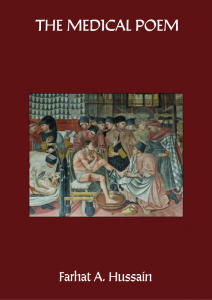
The Medical Poem
Author: Farhat A. Hussain
ISBN: 978-1-0686653-2-5 (pbk)
Size: 297 x 210 mm
Profile: Portrait
Format: Paperback
Other formats: To be announced
Pagination: 80
c. 34,000 words excluding preface and bibliography
Price: To be announced
Date of publication: 7.3.2026
An increasingly topical subject concerning the teaching of medicine by advocates in the present-time, this work provides vital historical depth of the relevance and value of the medical poem for educators and medical students. Commencing with the ancient world, evidence is provided of the use of the medical poem in China, Greece and Rome in addition to medieval Byzantium. A powerhouse of medicine in the medieval period, the medical poems of the Muslim world are assessed, with special reference to that of Ibn Sīnā (Avicenna), one of the most influential medical authorities in the medieval and post-medieval periods, also in Europe. The use of this medical poem in Latin in Europe is explored, as also a number of other medical poems authored in Italy, especially Salerno and their use elsewhere in Italy, France, England and other parts of Europe. Significantly, the devising and reading of medical poems by women and others who were not affiliated to medical schools and universities in the medieval and Renaissance periods is highlighted in celebrating this alternative media of medical education and learning that is often absent or underestimated in various studies of the history of medicine and the history of education. The interaction of cultures and civilizations is examined concerning this subject, as are relationships of proximity and other relevant issues. A rich aspect of medical and cultural history, the medical poem is celebrated as an incredible tool for those who were and are interested in medicine and health.
‘Poetry played a vital role in the transmission of medical knowledge throughout the ancient Graeco-Roman, Middle Eastern, Indian, and medieval Islamic and Christian worlds. Yet the poem’s full potential as both a keystone of formal medical education and a sometimes subversive alternative to it has not been demonstrated until now. This rich compendium of texts and commentary brings a previously invisible genre to light. Traveling from ancient Rome and Baghdad to medieval France, Renaissance Padua, and 21st-century London, the medical poem bridged philosophy and practice, diagnosis and prevention. Farhat A. Hussain faithfully traces that journey. He shows how, constructed as a teaching aid, the medical poem simultaneously digested and disseminated medical information, supplied a powerful mnemonic aid for hands-on diagnosis, hosted debate, borrowed the conventions of epic verse, and democratized medicine by incorporating the voices of patients, female health practitioners, and others excluded from a slowly emerging medical academy. Poetry’s natural portability also made the medical poem a vital forum of cross-cultural and intergenerational exchange, especially between east and west. This is a comprehensive, truly multi-cultural survey of the medical poem from its origins in ancient Greece and China through the writings of the Central Asian polymath Ibn Sīnā (Avicenna) to the anonymous medieval Flower of Medicine, ending with the medical poem’s surprising legacies in the romantic-era poetry of Keats and Schiller and ultimately in the 21st-century medical school, where poetry is still used to ‘teach’ empathy. The Medical Poem will be a useful resource for literary scholars, medical historians, those who teach, study and work in medicine and the broader public alike.’
Jayne Lewis
Professor of English
University of California, Irvine.
‘In this era of globalisation, cultures meet in the physician’s office and lecture theatre on a daily basis. Rarely, however, does the history of medical traditions, cultures, and education meet in one place. Farhat A. Hussain has written a time capsule in which he achieves exactly that. ‘The Medical Poem’ provides a compelling view on dissemination of medical knowledge across space and time. It is a fine read to broaden your knowledge on the cultural history of medicine, or simply be inspired by quotes of people like Ibn Sina or Homer at the end of a long day.’
Frank J. Wolters, MD PhD
Assistant Professor of clinical epidemiology of neurocognitive disorders
Erasmus MC – University Medical Centre Rotterdam.
‘Medical education has a long-standing history; yet sometimes our current understanding and knowledge of medicine, even though it is the apex of centuries of study and medical learning, is almost taken for granted. By providing unique insights into how illness, injury and well-being have been conceptualised in literature over time and across cultures, The Medical Poem by Farhat A. Hussain draws our attention to the significance of this underrepresented aspect of medical education. Charting the richness of the history of this field, this interesting study highlights very well ancient and subsequent globalisation in the generation and sharing of medical knowledge and makes important contributions to the decolonialisation and humanisation of medical education.’
Dr Katrin Augustin
School Academic Lead for Development, Diversity & Inclusion
Programme Director, Online MSc Public Health
School of Life Course & Population Sciences
Faculty of Life Sciences & Medicine
King’s College London